|
Meeting Minutes from InspireSeattle Social on June 8, 2013
Who are the Real Moochers Among
Us?
Our speaker was John
Burbank, Executive Director of the
Economic Opportunity Institute,
or EOI. EOI's mission is to restore the promise of the middle class by
advancing public policies that promote educational opportunity, good jobs,
healthy families and workplaces, and a dignified retirement for all. EOI is an
independent, nonpartisan, non-profit public policy center using research,
education and advocacy to shape public debate and advance new policy ideas that
help build an economy that works for everyone. Working in concert with
grassroots organizations, community coalitions and elected officials, EOI
publishes research, shapes public debate and catalyzes policy initiatives that make
Washington state better. Before founding EOI, John was political director of
the Washington State Labor Council. John is a member of the National Academy of
Social Insurance.
In 1998, John and others saw
the need for a public policy institute in Washington state. Existing “public
policy” organizations at that time were advocates of market solutions for state
needs, and in John’s mind actually worked against the interests of the public. EOI is a think tank for the middle class, not the wealthy class. A key goal of
EOI is to assist lower income people moving into the middle class, and to
protect those people from unfair policies. He stressed the importance
of being nonpartisan and he also labeled actions of EOI as "extra-partisan" in many ways.
EOI works at the state
level, not the national level. John indicated that achieving success at a national
level is very difficult, but at a state level, EOI has had many successes,
including:
- In 1998, leading the effort to establish the strongest minimum wage law in the country here in Washington
state
- Basic healthcare expansion to an additional 175,000 state residents
- Establishment of a state estate tax
- Working with the City of Seattle on a new ordinance for employee sick days
EOI also led the effort to
add 10 cents to the cost of espresso drinks to help fund early learning
initiatives, but this was defeated at the polls. However, John stressed how work on
issues at a state level can then springboard to success at a national level.
The goal of EOI is
to enhance economic opportunity and security for state residents. John
explained that Washington state has the most regressive tax system in the entire country,
and that this trend towards greater and greater regression has been proceeding
since 1980. As an example, John spoke of tuition costs for state
universities. In 1980, the state paid 80% of the costs associated with running our state universities, with tuition
covering the remaining 20%. Today, this ratio has flipped, with the state
covering 29% and tuition covering 71%.
The vast majority of
citizens have faced rising costs yet wages (adjusted for inflation) have
stagnated over the past 30+ years (i.e., since the beginning of the "Reagan
Revolution"). In 1980 a significant number of employees received pensions
from their employer; today this is rare. In the place of pensions, if one
is lucky, there are 401K plans that put the onus of managing retirement funds on
the employee, who much more often than not doesn’t have the experience or know
how to do so effectively. This is a far riskier situation for employees.
Also, health care and childcare costs have dramatically increased. In 1980, the typical home could get by with just
one parent working. The other parent (usually Mom) could stay home to provide childcare.
This is not the case today.
Since World War II, there
has been a remarkable increase in the nation's economic productivity. Up
until 1980, wages and benefits moved roughly in parallel with these increases in
productivity. These increases were also accompanied by a tremendous
increase in state
infrastructure investment. These trends were effectively broken when Reagan
fired striking air traffic control workers, and a nationwide attack on unions and workers
began. As a result, in spite of a continuing rise in productivity,
we have had wage stagnation for all except those at the very, very top.
Today there are far more
resources in an expanded economy. The question is “who owns them?” The answer is
corporations (and those that own and run them). The distribution of income in the US
now shows:
- The bottom 90% of workers average annual salary is $29,000
- 90% to 95% is $125,000
- 95% to 99% is $205,000
- 99% to 99.5% is $418,000
- 99.5% to 99.9% is $2,000,000
- For the 99.99% and above it is $22,000,000
In Washington state, the average hourly
wage for men (adjusted for inflation) has dropped since 1980 from $26 to $23.
For women it has increased from $13 to $17, but the gender inequality is still
significant. As average wages for the vast majority of workers have eroded,
the cost of healthcare has increased, which translates into less
income for saving and for paying bills.
John then spoke of the need
for reform in our tax system. The audience mentioned how Apple's CEO Tim
Cook was called before Congress based on the tax avoidance schemes of the US's
largest corporation. At the same time
the Internal Revenue Service is
itself under a critical lens. These events point to the strong sense in our country that
tax collectors are conspirators (and downright evil) and that it is one's patriotic
duty to avoid paying taxes as much as possible. Meanwhile fear around national
debt is constantly raging. John gave a local example of highly successful tax
avoidance: Microsoft is now using Reno, Nevada as its sole distributor of software to
avoid paying taxes in Washington state.
John then asked “who is to
blame for how things have gone in the past 30 years?” The audience answered
“Republicans”, “rich people”, etc., but John pointed out that both political
parties are to blame. Democrats have not been leading a fight to reverse these
trends.
John then spoke of Social
Security. There has been a long-term campaign to diminish Social Security,
instead of working on what is truly needed: greater benefits. John mentioned
that Maria Cantwell has been doing some work in this area, including drafting
a bill to couple Social Security payouts to an alternative inflation index, the CPIE,
where the “E” stands for “Elderly”. This CPIE would be a consumer price index based on
the expenses
typically faced by the retired folks who actually depend on Social
Security. Sadly, Cantwell failed to introduce this bill to Congress.
John spoke of the “Social
Security penalty” on working women. If a woman stays at home to work on
raising her family, this labor is not eligible for Social Security. Also,
childcare, which is a labor area largely filled by women, is typically a lower
wage job. This reflects the low value that our country has placed on raising
families, and contrasts us with other countries.
Two thirds of retirees
depend on Social Security to see them through to the end of their
lives. Yet there remains a strong push in this country to weaken it. John
pointed out that an electorate democracy (one vote for each citizen) is not the
same thing as a true “social democracy”. John believes those politicians
seeking to weaken Social Security are passionately against the idea of a social
democracy, and want to reverse previous efforts made to obtain a more equal society.
(George Lakoff writes about this in his book
Don’t Think of an Elephant)
To make Social Security
sustainable there is a simple fix -- eliminate the cap on annual employee
contributions. If this were to happen, there would be no more concerns about an under-funded Social Security system. EOI has prepared a
video
to demonstrate how this could work. John also indicated we need to think about a supplemental Social
Security program at the state level and indicated he believes that it will come to this in the future to keep retirees solvent.
John then talked about the
value of our state’s initiative process. Initiatives are a valuable tool for
public input to state government. Tim Eyman has put this process in
a bad light for many with his constant efforts, pushing initiatives year
after year until they pass, but John urged us to look past this and use
initiatives to benefit progressive causes. The initiative process needs
well-thought-out efforts to ensure success. Potential initiative topics John
mentioned included K-12 education, higher education and leave-from-work for new
parents.
Other issues John mentioned
that EOI is working on included:
- See Washington state implement a 401K plan to cover the 50%
of workers that don’t have a 401K plan at their current place of employment.
- Pay It Forward – under this
proposed program, students get free tuition to state schools but then must
contribute a percentage of their income upon graduation back to the state over
the first block of their post-graduate working years. EOI is still working on
the details as to how this system could work to make it cost effective. The
state would need to track student’s 1040 IRS forms for income data, thus a
federal buy-in to the program is necessary.
- EOI continues to defend the minimum
wage but is now considering how to take this a step further and secure a living wage for all workers.
- Today it is common for a CEO to make 400 to 600 times the salary of the average employee within the company.
EOI is also working to develop a program that would set a "maximum compensation".
- EOI would also like to see a switch to proportional representation in the Olympia legislature.
John ended by passing around an
EOI sign-up sheet and encouraged all to visit their
website.
Many thanks to John for his
time and insights.
|
|
| |
Previous meeting minutes
- June 3, 2017, Immigration Workshop
- February 19, 2017, Action Against Trump
- December 4, 2016, Transforming Anger
- July 9, 2016, Growth in West Seattle
- May 7, 2016, Trans-Pacific Partnership
- March 5, 2016, Hidden Half of Nature
- November 15, 2015, Nick Licata: ALEC
- October 3, 2015, City Council Forum
- May 30, 2015, Income Inequality
- April 25, 2015, Ending the War on Drugs
- March 14, 2015, Consequences of Energy
- February 7, 2015, Fighting Hunger
- November 15, 2014, Restoring Democracy
- October 4, 2014, The Political Mind
- May 31, 2014, Obamacare
- May 3, 2014, Surveillance Technology
- March 8, 2014, Sexual Abuse in the Military
- January 25, 2014, No New Jim Crow
- November 16, 2013, WAmend: SuperPacs
- October 19, 2013, Earthquake Risk
- September 7, 2013, Wiring the Brain
- June 8, 2013, Who are the Moochers?
- April 27, 2013, Port of Seattle
- March 23, 2013, Electing by District
- February 23, 2013, Beyond Coal
- January 12, 2013, Saving Our Forests
- October 20, 2012, Climate Change
- September 15, 2012, Initiative Process
- June 16, 2012, J Street
- May 12, 2012, Transportation in Seattle
- March 31, 2012, Death Penalty
- February 25, 2012, Duwamish River
- January 21, 2012, Bob Ferguson
- November 19, 2011, Immigration Policy
- October 15, 2011, Inequality
- June 18, 2011, Social Justice Issues
- May 21, 2011, Washington Investment Trust
- April 23, 2011, Panel: Community Needs
- February 26, 2011, Sustainability
- January 22, 2011, Social Security
- November 6, 2010, Health Care Reform
- October 2, 2010, Charter Schools
- June 26, 2010, Sustainable Biofuels
- May 22, 2010, Education in Afghanistan
- March 20, 2010, Debt Relief
- January 23, 2010, Recycling
- November 7, 2009, Genetically Engineered Foods
- October 10, 2009, Homelessnesss
- September 19, 2009, Population
- June 13, 2009, Racism
- May 16, 2009, Nuclear Energy
- April 11, 2009, Affluenza
- March 7, 2009, Education
- January 10, 2009, Iraqi Refugees
- November 8, 2008, Palestine
- October 11, 2008, Corporate Responsibility
- September 13, 2008, Sally Clark
- June 21, 2008, U.N. Millenium Goals Project
- May 16, 2008, Evangelicalism
- March 29, 2008, Media
- February 23, 2008, Niger Delta
- January 19, 2008, Environmental Issues in Washington State
- Nov. 17, 2007, Affordable Housing
- Oct. 13, 2007, Health vs. Healthcare
- Sept. 8, 2007, Nick Licata
- June 23, 2007, Local Transportation
- May 5, 2007, Global Warming
- Mar. 31, 2007, Publicly Financing Campaigns & Impeachment
- Feb. 09, 2007, Family Planning and Population
- Jan. 6, 2007, Peak Oil
- Oct. 20, 2006, Upcoming Election, David Goldstein
- Sept. 17, 2006, Initiative Process
- July 22, 2006, Women in Politics
- June 10, 2006, Local Transportation
- April 22, 2006, Language in Politics
- Feb. 25, 2006, War in Iraq
- Jan. 14, 2006, Eric Oemig
Previous IAN Events
|
| |
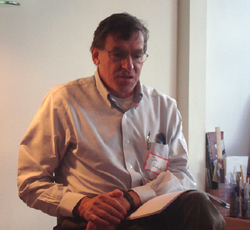
Speaker: John Burbank
|
| |

|
| |

|
| |
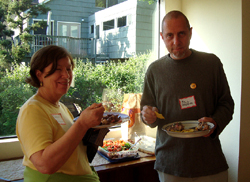
|
| |

|
| |
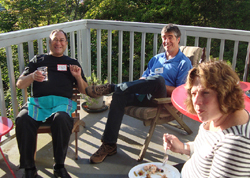
|
| |
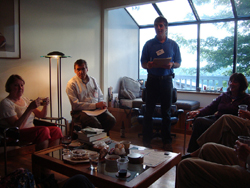
|
| |
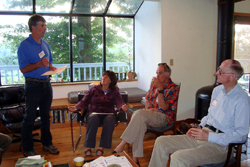
|
| |
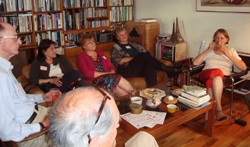
|
| |
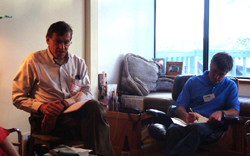
|
| |
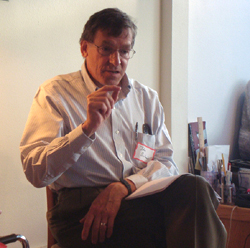
|
| |
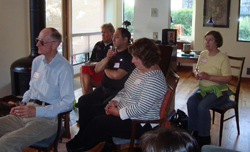
|
|


 PAST SOCIALS
PAST SOCIALS

 PAST SOCIALS
PAST SOCIALS